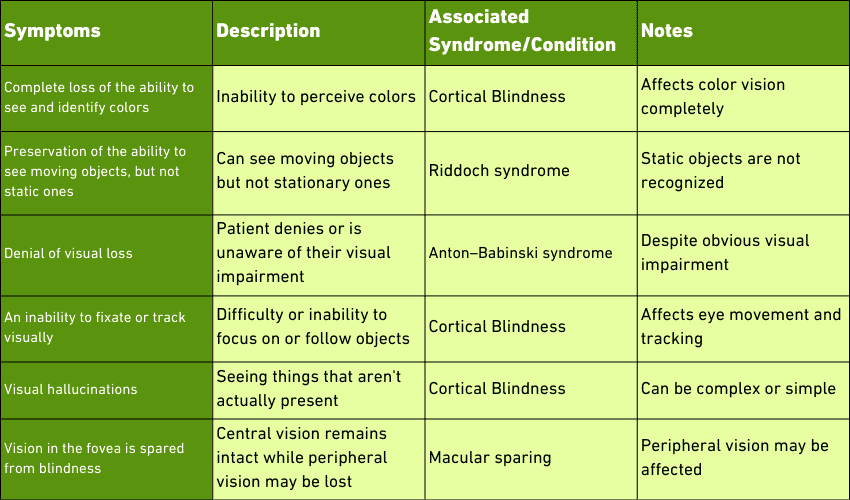Quick Reference
What Is Cortical Blindness?
Cortical blindness is a form of blindness caused by damage to the brain's occipital cortex. The visual cortex is the part of the brain responsible for processing visual information. When it is damaged, the brain cannot process visual information correctly, which leads to blindness.
Cortical Blindness vs. Cortical Visual Impairment (CVI)
Cortical blindness is a subset of neurological visual impairment (NVI) caused by damage to the cortex. While cortical visual impairment (CVI) is a subset of NVI caused by damage to the visual cortex that results in a partial loss of vision.
Delayed Visual Maturation vs. Cortical Visual Impairment
CVI is a neurological disorder that results in a lack of vision, while DVM is a condition in which a child's vision does not develop normally but improves over time.
Blindsight
Blindsight is a phenomenon where individuals with damage to the visual cortex can still partially perceive their surroundings even though they are considered blind.
Cortical Blindness Causes
- Cardiac embolism
- Stroke
- Head trauma
- Occipital lobe epilepsy
- Infection, e.g., HIV
- Hyponatremia
- Severe hypoglycemia
- Eclampsia
- Creutzfeldt-Jacob disease
- MELAS (mitochondrial myopathy, encephalopathy, lactic acidosis, and stroke-like episodes)
What Are The Symptoms Of Cortical Blindness?
- The complete loss of the ability to see and identify colors.
- Preservation of the ability to see moving objects, but not static ones. (Riddoch syndrome)
- Denial of visual loss (Anton–Babinski syndrome)
- An inability to fixate or track visually
- Visual hallucinations
- Vision in the fovea is spared from blindness (Macular sparing)
Cortical Blindness Treatment
- Restitution therapy
- Compensation therapy
- Substitution therapy


- TULIMED - Lightweight - 4 Sections Aluminum Folding Walking Cane for The Blind or Visually Impaired Blind Cane Folds

- AIXPI Magnifying Glass with Light, 30X Handheld Large Magnifying Glass

- English Atomic Talking Watch Easy to use for Seniors Blind Men Women Loud Talking Sound Clock for Visually Impaired
Ever marveled at the human eye? Prepare for a surprise: "Cortical Blindness". We're still learning about vision, and this is a game-changer.
Why? It's not the eye—it's the brain. Damage to the occipital cortex causes it. This blindness isn't like the rest. Join us as we uncover its mysteries, see its uniqueness, and explore help for those affected.
What is cortical blindness?
Cortical blindness arises when the visual cortex, a crucial brain region for sight, is impaired. This area interprets images our eyes capture. In its absence, vision becomes compromised. Typically, our eyes relay visuals to the brain, which then processes them, enabling us to perceive. However, with cortical blindness, this interpretation is disrupted, affecting vision. [1]
Two variations exist: complete and incomplete. Incomplete allows for vague perceptions like light or shadows, whereas complete results in total vision loss. The former is more prevalent. It affects both children and adults, though children are more susceptible. [2] [3]
To understand health holistically, especially in the context of such conditions, explore what it means to be healthy.
Cortical blindness vs. cortical visual impairment (CVI)
Cortical blindness is a kind of eye problem caused by brain damage. People with this might lose all their vision or just some. They might also have other problems like seizures. CVI is another kind of eye problem caused by damage to a specific part of the brain. People with CVI may lose some vision but might not have other problems. [4]
These two problems are different because they happen for different reasons and in different parts of the brain. One way to tell them apart is by checking how the eye reacts to light. People with cortical blindness will react to light, but those with CVI won't.
Some big eye groups use the terms "cortical blindness" and "CVI" to mean the same thing, which can be confusing.[5] Living with cortical blindness can also sometimes lead to crippling anxiety especially when navigating unfamiliar environments or facing new challenges.

Delayed visual maturation vs. cortical visual impairment
Some people use "cortical visual impairment" (CVI) and "delayed visual maturation" (DVM) as if they're the same, but they're not. CVI is a brain problem that makes you not see, while DVM is when a kid's sight is slow to get better but does improve.[6]
Both CVI and DVM can make it hard for kids to see things right. But CVI is forever, while DVM usually gets better by the time a kid is one year old. There's no fix for CVI, but some treatments can help kids see better. DVM often gets better on its own, but sometimes a doctor might suggest ways to help.
Blindsight
Blindsight is when people who are blind because of brain damage can still sort of "see" without knowing it. Even if they can't see in the usual way, some part of their brain can still pick up things like moving lights. They might also have other odd vision experiences. [7]
To test for blindsight, people are asked to walk and dodge things without seeing them. Those with blindsight can do this without knowing how.[8]
Many people with certain brain injuries have blindsight. But experts are still figuring out why it happens and how it works.[9]

Cortical blindness causes
The causes of cortical blindness can vary, but it is most often caused by damage to the visual cortex. While cortical blindness primarily affects vision, it's crucial to be aware of other neurological conditions that can impact one's overall health. For instance, dementia can be fatal as it affects cognitive functions and can have severe implications. This damage can also be caused by many things, including [10]:
- Cardiac embolism
- Stroke
- Head trauma
- Occipital lobe epilepsy
- Infection, e.g., HIV
- Hyponatremia
- Severe hypoglycemia
- Eclampsia
- Creutzfeldt-Jacob disease
- MELAS (mitochondrial myopathy, encephalopathy, lactic acidosis, and stroke-like episodes)
According to the same source, there are a few rare conditions that can cause transient cortical blindness, such as:
- Hypertensive encephalopathy
- Infective endocarditis
- Posterior reversible encephalopathy syndrome (PRES)
The most frequent factors leading to cortical blindness in children, as stated in the same book, are:
- traumatic brain injury to the occipital lobe,
- congenital abnormalities of the same lobe, and
- perinatal ischemia.

What are the symptoms of cortical blindness?
Cortical blindness signs depend on how much the brain's back part is hurt. If it's a little hurt, a person might only see light and dark. If it's very hurt, they won't see anything. There can also be other problems that come with it. Cortical blindness may also be accompanied by other symptoms such as; [11]
- The complete loss of the ability to see and identify colors.
- Preservation of the ability to see moving objects, but not static ones. (Riddoch syndrome)
- Denial of visual loss (Anton–Babinski syndrome)
- An inability to fixate or track visually
- Visual hallucinations
- Vision in the fovea is spared from blindness (Macular sparing)
Important note: Children with blindness often face unique challenges in their parenting journey. Adopting a gentle parenting approach can be beneficial in fostering a supportive and understanding environment for the child.

How is cortical blindness diagnosed?
To find out if someone has cortical blindness, doctors do several tests. They might check blood, heart rhythms, and use machines to look at the brain. The best way to check is by taking pictures of the brain using a CT scan or MRI. [12]
These pictures show if there's any damage causing the blindness. Other tests can also check how the eyes work and respond to light.
Can cortical blindness be corrected?
If something treatable causes cortical blindness, fixing that might cure the blindness. But if the brain is hurt for good, the blindness will stay.
Sometimes, people got their sight back after doctors treated problems like eclampsia. But if the brain was badly damaged, like from a stroke, the blindness didn't go away. [13]
There's no fix for cortical blindness, but there are ways to help people live better with it. Also note, teenagers with cortical blindness might experience heightened separation anxiety, especially when forming new relationships or transitioning to different life stages. This anxiety can manifest differently than in their peers. To help parents and caregivers navigate these challenges, our article on separation anxiety in teenage relationships sheds light on its causes and offers practical tips.

Cortical blindness treatment
There is no one-size-fits-all approach to cortical blindness treatment. The most appropriate treatment for a particular patient will depend on the underlying cause of the blindness and the extent of the damage. However, most treatments involve some form of visual training and rehabilitation. This may include restitution therapy, compensation therapy, or substitution therapy. [14]
Restitution therapy is used to recover any visual field deficits. Compensation therapy involves using saccadic eye movements to capture visual stimuli that would otherwise fall onto the blind part of the visual field. Substitution therapy uses a prism or other devices to project visual stimuli from the blind side of the visual field to the normal one.
Conclusion
Cortical blindness happens when a part of the brain gets hurt. Things like strokes, head injuries, or certain diseases can cause it. How it affects people depends on how bad the damage is. Some might get their sight back, but others won't. There's no way to fix it completely, but treatments can make life better for those who have it.
FAQ
Can Cortical Visual Impairment Get Worse?
Cortical visual impairment can deteriorate if the underlying cause is progressive, such as glaucoma or macular degeneration. However, if the underlying cause is static, such as stroke or cerebral palsy, the cortical visual impairment will not usually worsen.
Can Glasses Help CVI?
Glasses will not cure cortical visual impairment, but they may help to improve vision in some cases. For example, if the condition is caused by cataracts, then surgery to remove cataracts may help to improve vision. In cases like stroke or cerebral palsy, glasses may help reduce double vision symptoms.
What Is The Main Feature Of Cortical Blindness?
The main feature of cortical blindness is that the patient cannot see anything in the central part of their visual field, even if they are looking directly at it. This is because the damage to the brain means that the patient cannot process visual information from the central part of their field of vision.
References
- National Eye Institute: How the Eyes Work
- NIH: Cortical Blindness
- Science Direct: Cortical Blindness
- Wikipedia: Cortical Blindness
- American Association for Pediatric Ophthalmology & Strabismus: Cortical Visual Impairment
- American Association for Pediatric Ophthalmology & Strabismus: Cortical Visual Impairment
- NIM: Cortical Blindness
- ResearchGate: Blindsight in Action
- Wikipedia: Blindsight
- NIM: Cortical Blindness
- Wikipedia: Cortical blindness
- NIH: Cortical Blindness
- Science Direct: Cortical Blindness
- NIM: Cortical Blindness

